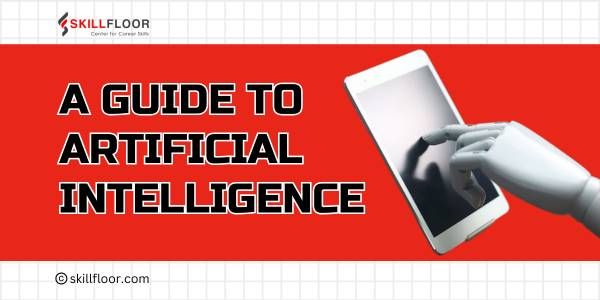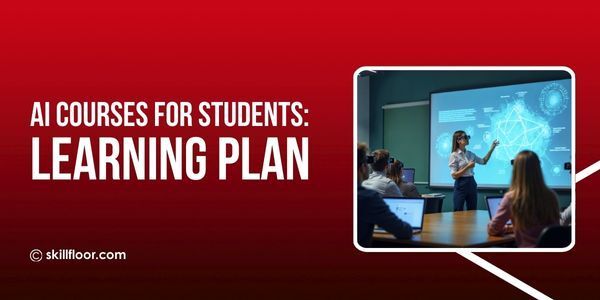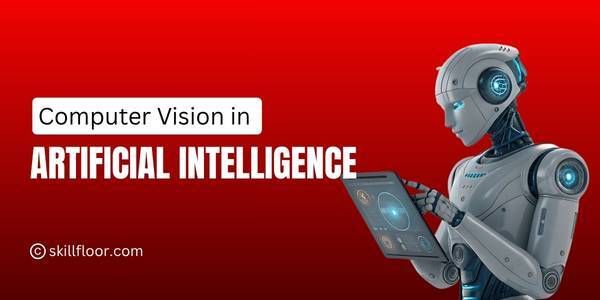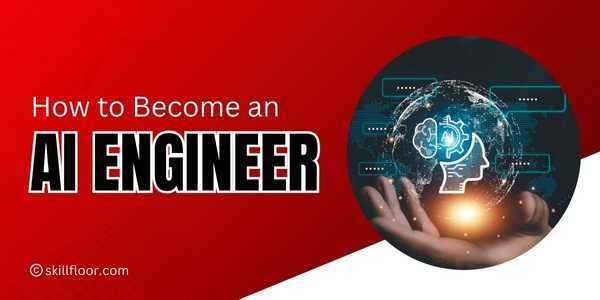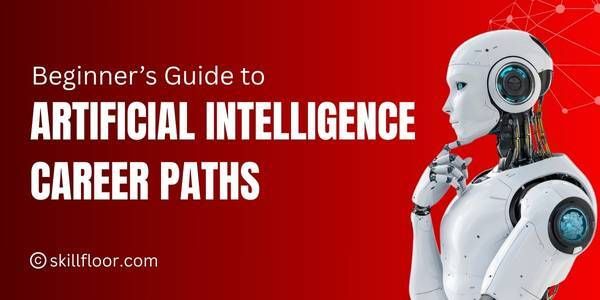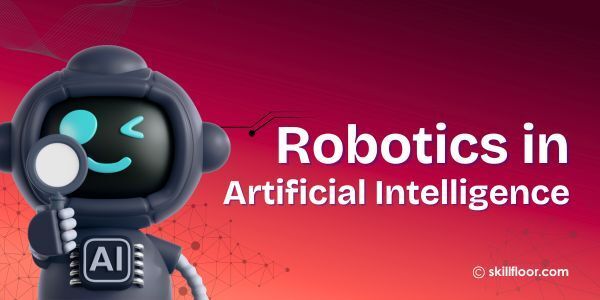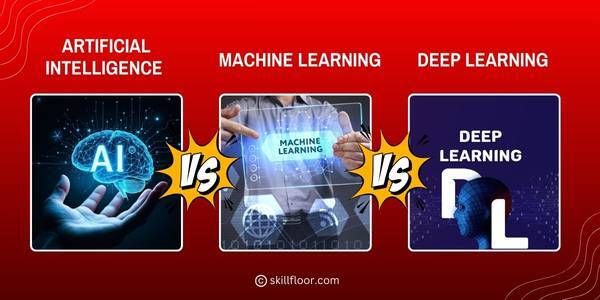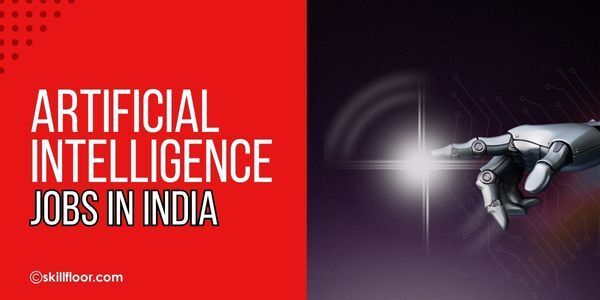TABLE OF CONTENT:
-
Applications of Artificial Intelligence
-
Role of Artificial Intelligence
-
Scope of Artificial Intelligence
-
Artificial Intelligence Algorithms
-
Artificial Intelligence course syllabus
-
Robotics in Artificial Intelligence
-
Artificial Intelligence a Modern Approach
-
Progress in Artificial Intelligence
-
Latest Technology in Artificial Intelligence
-
Future of Artificial Intelligence
Artificial Intelligence (AI) is a rapidly advancing field that aims to replicate intelligent human behavior in machines. It involves the development of computer systems and algorithms capable of learning, reasoning, and making decisions. AI encompasses various subfields such as machine learning, natural language processing, computer vision, and robotics. It has the potential to transform industries, revolutionize healthcare, enhance automation, and drive innovation across multiple sectors.
AI technologies are being applied in areas like autonomous vehicles, virtual assistants, recommendation systems, fraud detection, and more. As AI continues to evolve, it presents both exciting opportunities and challenges, raising questions about ethics, privacy, and the future of work. With its growing significance and impact on society, understanding the fundamentals and applications of artificial intelligence is essential in today's technology-driven world.
Artificial Intelligence has made significant strides in recent years, thanks to advancements in computing power, availability of vast amounts of data, and breakthroughs in algorithmic approaches. Machine learning, a key component of AI, enables systems to learn from data and improve their performance over time without explicit programming.
Natural language processing (NLP) allows machines to understand and interpret human language, enabling chatbots, language translation, and voice recognition systems. Computer vision empowers machines to analyze and interpret visual data, leading to applications in autonomous vehicles, facial recognition, and object detection.
As AI continues to advance, there are also important considerations to address. Ethical concerns, such as bias in algorithms and privacy issues, require careful attention. Ensuring transparency, fairness, and accountability in AI systems is crucial for their responsible development and deployment.
1. Applications of Artificial Intelligence
Artificial Intelligence (AI) has found applications in numerous industries, revolutionizing processes and opening up new possibilities. In healthcare, AI is used for medical imaging analysis, aiding in the early detection of diseases and improving diagnostic accuracy. AI-powered chatbots and virtual assistants are enhancing customer service and support in various sectors, providing personalized recommendations and quick responses. In finance,
AI algorithms are employed for fraud detection, risk assessment, and algorithmic trading, enabling faster and more accurate decision-making. AI is also transforming the manufacturing sector with the implementation of smart robotics and automation, optimizing production processes and increasing efficiency. In the transportation industry, AI is driving advancements in autonomous vehicles, leading to safer and more efficient transportation systems. AI-powered recommendation systems are prevalent in e-commerce, entertainment, and content streaming platforms, offering personalized suggestions to users based on their preferences and behavior.
In cybersecurity, AI is utilized for threat detection, anomaly detection, and real-time response, strengthening defenses against cyber threats. These are just a few examples of how AI is being applied across industries, demonstrating its potential to revolutionize operations, improve decision-making, and enhance user experiences. As AI technology continues to advance, we can expect even more innovative applications that will shape the future of various sectors and transform the way we live and work.
2. Role of Artificial Intelligence
Artificial Intelligence (AI) plays a crucial role in our modern world, driving advancements and transforming various aspects of society. One of its key roles is in automation, where AI technologies automate repetitive and mundane tasks, freeing up human resources for more complex and creative endeavors. AI algorithms can process and analyze massive amounts of data with speed and accuracy, enabling valuable insights and informed decision-making.
AI also contributes to improving efficiency and productivity in industries by optimizing processes, predicting maintenance needs, and reducing operational costs. In the healthcare sector, AI assists in diagnosis, treatment planning, and drug discovery, leading to more precise and personalized healthcare solutions. AI-powered virtual assistants and chatbots enhance customer service experiences, providing quick and personalized responses to inquiries.
Additionally, AI is making significant contributions in fields such as finance, transportation, agriculture, education, and cybersecurity, among others. Its ability to learn, adapt, and continuously improve allows AI systems to tackle complex problems and provide innovative solutions. As AI technology continues to evolve, its role will become even more prominent, revolutionizing industries, driving innovation, and shaping the future of our society.
3. Scope of Artificial Intelligence
The scope of artificial intelligence (AI) is vast and continuously expanding, presenting immense opportunities for innovation and transformation across various industries. AI involves the development and deployment of intelligent machines that can mimic human cognitive abilities, such as learning, reasoning, problem-solving, and decision-making. The scope of AI extends to areas such as machine learning, natural language processing, computer vision, robotics, and expert systems. In fields like healthcare, AI can assist in diagnosing diseases, analyzing medical images, and designing personalized treatment plans. In finance,
AI algorithms can be used for fraud detection, risk assessment, and algorithmic trading. AI-powered virtual assistants, chatbots, and recommendation systems are becoming increasingly prevalent in the customer service and e-commerce sectors. Autonomous vehicles and drones are transforming transportation and logistics. The scope of AI also encompasses ethical considerations, including data privacy, transparency, and the responsible use of AI technologies.
As AI continues to evolve, its scope will likely expand into new domains, contributing to advancements in areas like personalized medicine, smart cities, cybersecurity, and more. Embracing AI technologies and harnessing their potential will shape the future, enabling improved efficiency, decision-making, and innovation across industries and improving the quality of life for individuals worldwide.
4. Artificial Intelligence Algorithms
Artificial Intelligence (AI) algorithms are the backbone of AI systems, enabling machines to learn, reason, and make decisions. These algorithms process vast amounts of data to extract patterns, insights, and knowledge. Machine learning algorithms, a subset of AI algorithms, learn from data and improve their performance over time without explicit programming. They can be categorized into supervised learning, unsupervised learning, and reinforcement learning algorithms.
Supervised learning algorithms learn from labeled examples to make predictions or classify new data. Unsupervised learning algorithms, on the other hand, discover patterns and relationships in unlabeled data. They are used for tasks such as clustering and dimensionality reduction.
Reinforcement learning algorithms learn through interactions with an environment, receiving rewards or punishments based on their actions. They are employed in decision-making scenarios where an agent learns to take actions that maximize cumulative rewards. Other AI algorithms include natural language processing algorithms, which enable machines to understand and process human language, and computer vision algorithms, which enable machines to interpret visual data. These algorithms utilize techniques such as deep learning, neural networks, genetic algorithms, and support vector machines, among others.
Each algorithm has its strengths and limitations, and the selection of the appropriate algorithm depends on the specific task and data at hand. With ongoing research and advancements, AI algorithms continue to evolve, pushing the boundaries of what machines can achieve in terms of understanding, learning, and problem-solving.
5. Artificial Intelligence course syllabus:
Introduction to Artificial Intelligence: Overview of AI concepts, history, and applications.
Machine Learning: Introduction to supervised and unsupervised learning algorithms, including linear regression, logistic regression, decision trees, and clustering.
Deep Learning: Neural networks, convolutional neural networks (CNN), recurrent neural networks (RNN), and deep learning frameworks like TensorFlow or PyTorch.
Natural Language Processing: Techniques for processing and understanding human language, including text preprocessing, sentiment analysis, and language generation.
Computer Vision: Image and video analysis, object detection, image classification, and convolutional neural networks for computer vision tasks.
Reinforcement Learning: Principles and algorithms for training agents to make decisions based on rewards and penalties.
AI Ethics and Responsible AI: Discussions on ethical considerations, bias, fairness, and privacy in AI development and deployment.
AI Applications: Case studies and projects applying AI techniques in various domains such as healthcare, finance, robotics, and recommendation systems.
AI Tools and Libraries: Introduction to popular AI tools, libraries, and frameworks like scikit-learn, Keras, and OpenCV.
Practical Implementation: Hands-on projects and assignments to apply AI concepts and techniques to real-world problems.
Emerging Trends: Exploring recent advancements in AI, such as explainable AI, generative models, and reinforcement learning in complex environments.
Final Project: A comprehensive project to demonstrate mastery of AI concepts and techniques.
6. Robotics in Artificial Intelligence
Robotics plays a significant role in the field of Artificial Intelligence (AI) by combining the power of intelligent algorithms with physical systems. It involves the design, development, and deployment of robots that can perceive their environment, make decisions, and interact with the world around them. Robotics in AI encompasses various aspects, including perception, motion planning, control systems, and human-robot interaction.
By integrating AI algorithms into robots, they can exhibit autonomous behavior, adapt to changing environments, and perform complex tasks with precision and efficiency. Robotics in AI has applications across industries such as manufacturing, healthcare, logistics, agriculture, and exploration. It enables the automation of repetitive and dangerous tasks, enhances productivity, and contributes to advancements in areas like surgical robotics, autonomous vehicles, and unmanned aerial systems. Additionally, robotics research in AI focuses on areas such as machine learning for robot perception, reinforcement learning for robot control, and human-robot collaboration. As robotics technology continues to advance, we can expect further integration of AI algorithms to create intelligent robots that can interact seamlessly with humans, understand their intentions, and contribute to a wide range of applications that benefit society.
7. Artificial Intelligence a Modern Approach
Modern approaches in Artificial Intelligence (AI) are revolutionizing the field, pushing the boundaries of what machines can accomplish. These approaches leverage advancements in technology, computational power, and data availability to create more intelligent and versatile AI systems. One prominent approach is deep learning, which utilizes artificial neural networks with multiple layers to learn representations of data. Deep learning has achieved remarkable success in various tasks such as image and speech recognition, natural language processing, and autonomous driving.
Another modern approach is reinforcement learning, where agents learn through trial and error interactions with an environment to maximize rewards. This approach has led to breakthroughs in game-playing agents, robotics, and optimization problems. Generative models, such as generative adversarial networks (GANs) and variational autoencoders (VAEs), are employed to generate new data samples and learn underlying patterns and distributions. These models have applications in image and video synthesis, text generation, and data augmentation. Transfer learning is another significant approach that allows models to leverage knowledge from pre-trained models on large datasets and apply it to new tasks with limited data. This approach enables faster model development and improved performance in various domains. Furthermore, explainable AI has gained attention, aiming to develop models and techniques that provide interpretable and transparent results, ensuring ethical and accountable AI systems.
Modern AI approaches continue to evolve and address challenges such as bias, fairness, and privacy, with a focus on responsible and ethical AI development. With ongoing research and innovation, these approaches are shaping the future of AI, enabling breakthroughs and unlocking new possibilities in diverse fields.
8. Progress in Artificial Intelligence
Progress in artificial intelligence (AI) has been significant in recent years, with advancements in technology, algorithms, and computing power driving transformative changes across various domains. AI has made significant strides in areas such as machine learning, natural language processing, computer vision, and robotics.
In machine learning, deep learning techniques, powered by neural networks, have achieved remarkable results in tasks such as image and speech recognition, natural language understanding, and recommendation systems. This has led to breakthroughs in areas like healthcare, finance, autonomous vehicles, and virtual assistants.
Natural language processing has improved language understanding, enabling chatbots, voice assistants, and language translation systems to provide more accurate and contextual responses. Computer vision algorithms have achieved human-level performance in tasks like object detection, facial recognition, and image classification, opening up applications in security, autonomous vehicles, and augmented reality.
AI-driven robotics has advanced significantly, with robots capable of performing complex tasks and collaborating with humans in various industries, including manufacturing, healthcare, and agriculture.
The availability of large datasets and advancements in data collection and storage have played a vital role in training and refining AI models. Additionally, the growth of cloud computing and the development of specialized hardware, such as graphics processing units (GPUs) and tensor processing units (TPUs), have accelerated AI computations and made AI applications more accessible.
Ethical considerations and responsible AI practices have gained attention, focusing on issues like bias, fairness, transparency, and privacy. Efforts are being made to ensure that AI technologies are developed and deployed in a manner that benefits society and upholds ethical standards.
As AI continues to evolve, emerging trends such as explainable AI, reinforcement learning in complex environments, and generative models are pushing the boundaries of what is possible. Continued research, collaboration, and investment in AI technologies will drive further progress, leading to advancements in areas such as personalized medicine, smart cities, cybersecurity, and more.
9. Latest Technology in Artificial Intelligence
The field of Artificial Intelligence (AI) is constantly evolving, driven by the emergence of new technologies that push the boundaries of what machines can achieve. One of the latest technologies in AI is the integration of AI with edge computing, enabling AI algorithms to be deployed directly on edge devices such as smartphones, IoT devices, and drones. This brings the power of AI to the edge, allowing for real-time data processing, reduced latency, and increased privacy and security. Another cutting-edge technology is the development of explainable AI (XAI) systems, which aim to make AI models more transparent and interpretable. XAI techniques provide insights into how AI systems make decisions, increasing trust and enabling better understanding of their inner workings.
Quantum computing is another area of rapid advancement in AI. Quantum computers have the potential to perform complex computations exponentially faster than classical computers, opening up new possibilities for solving complex AI problems. Additionally, advancements in natural language processing (NLP) have led to the development of more sophisticated language models, such as transformer-based models like GPT-3. These models can generate human-like text, engage in conversational AI, and perform language-related tasks with remarkable accuracy.
Reinforcement learning has also seen advancements, with algorithms like Proximal Policy Optimization (PPO) and Trust Region Policy Optimization (TRPO) enabling more efficient and stable learning in complex environments. The integration of AI with robotics and autonomous systems is another exciting area, where AI algorithms enable robots to navigate, perceive, and interact with their surroundings autonomously. These latest technologies in AI hold immense potential for addressing complex problems, improving decision-making, and transforming various industries such as healthcare, finance, transportation, and more. As technology continues to advance, we can expect further breakthroughs in AI that will shape our future and pave the way for new possibilities.
10. Future of Artificial Intelligence
The future of Artificial Intelligence (AI) holds immense potential for transformative advancements in various aspects of our lives. As AI technologies continue to evolve, we can expect to see their integration into numerous industries and sectors, revolutionizing processes, and unlocking new possibilities.
One key area of advancement is in autonomous systems, where AI-powered robots and vehicles will become increasingly capable of navigating complex environments and performing tasks independently. This has implications for industries such as manufacturing, logistics, and transportation, where automation and efficiency can be greatly enhanced. AI is also expected to play a pivotal role in healthcare, enabling personalized medicine, disease diagnosis, and drug discovery through advanced data analytics and predictive modeling. Additionally, AI-powered virtual assistants and chatbots will become more sophisticated, providing personalized and context-aware interactions, enhancing customer service experiences, and streamlining business operations. With the advent of big data and the Internet of Things (IoT), AI will continue to play a crucial role in extracting valuable insights from massive datasets and enabling intelligent decision-making in real-time.
However, as AI continues to advance, ethical considerations become increasingly important. Addressing issues of bias, transparency, privacy, and accountability will be crucial for the responsible development and deployment of AI systems. The future of AI also holds exciting possibilities in areas such as natural language processing, computer vision, and machine learning, where breakthroughs are expected to push the boundaries of what AI can achieve. Overall, the future of AI is filled with promise, where intelligent systems will augment human capabilities, drive innovation, and reshape industries, ultimately transforming the way we live, work, and interact with technology.
Summarizing the above context, Artificial intelligence (AI) has emerged as a transformative force with the potential to revolutionize industries and improve our daily lives. Its rapid progress and expanding scope have sparked both excitement and concerns.
On one hand, AI has shown tremendous promise in solving complex problems, enhancing decision-making processes, and driving innovation across various sectors. It has the potential to revolutionize healthcare, transportation, finance, education, and many other domains, making processes more efficient, personalized, and impactful. AI-powered technologies like autonomous vehicles, intelligent virtual assistants, and advanced data analytics have already begun reshaping industries and transforming the way we live and work.
However, AI also raises ethical and societal challenges. Concerns about data privacy, algorithmic bias, job displacement, and the impact on human autonomy and decision-making have surfaced. It is crucial to address these concerns proactively and ensure that AI is developed and deployed in a responsible and inclusive manner, with transparent algorithms and ethical frameworks.
To fully realize the potential of AI while mitigating its risks, interdisciplinary collaboration and a human-centric approach are essential. Ethical guidelines, regulatory frameworks, and industry standards should be established to guide the development and deployment of AI technologies. Collaboration between AI experts, policymakers, and stakeholders from diverse backgrounds will be crucial to ensure that AI benefits all of humanity.
As AI continues to advance, it is essential to emphasize the importance of continuous learning, upskilling, and reskilling to adapt to the changing job landscape. AI should be seen as a tool to augment human capabilities rather than replace them. Fostering a culture of responsible innovation, lifelong learning, and interdisciplinary collaboration will help us navigate the opportunities and challenges that arise from the ongoing progress in artificial intelligence.
Artificial intelligence holds tremendous potential to transform our world, but it requires careful navigation, ethical considerations, and a human-centric approach to ensure that it benefits society as a whole. By embracing the opportunities and addressing the challenges, we can harness the power of AI to create a more inclusive, efficient, and sustainable future.
Related Posts
AI vs Human Intelligence: Key Differences Explained
Discover the key differences between AI and human intelligence, and see how unde...
Gemini AI Models Explained: Features, Types & Use Cases
Learn how Gemini AI models work, including Nano, Pro, and Ultra. Explore feature...
AI Salary in India: Entry-Level to Expert Pay Guide 2026
AI Salary in India explained from entry-level to expert roles. Explore average p...
Free AI Course by Government of India: Benefits & Scope
Explore free AI courses by the Government of India, including eligibility, benef...
Do You Need a Degree to Get a Job in AI?
Wondering if a degree is required to break into AI? Discover practical new paths...
Artificial Intelligence for Students: Best Courses and ...
Discover the best AI courses and learning plans for students today. Learn how to...
Google Artificial Intelligence Course Online Free with ...
Learn Artificial Intelligence for free with Google’s online AI course. Earn a ce...
The Most Impactful AI Applications in Marketing
Explore the top AI applications in marketing, from personalization to automation...
What Are the Types of Agents in Artificial Intelligence?
Explore the types of agents in Artificial Intelligence, their key roles, and how...
Artificial Intelligence in Automation Testing
Discover how AI transforms automation testing, improves accuracy, reduces errors...
Ethics in Artificial Intelligence: Why It Matters
Discover why ethics in AI matters. Learn about bias, privacy, transparency, and ...
What is Computer Vision in Artificial Intelligence
Discover how computer vision in artificial intelligence helps machines see, unde...
Ultimate Guide to AI Tools for Developers
Discover top AI tools for developers to boost productivity, improve code quality...
How to Become an AI Engineer
Learn how to become an AI engineer with easy steps, practical skills, and guidan...
Beginner’s Guide to an Artificial Intelligence Career P...
Explore beginner-friendly artificial intelligence career paths. Learn key skills...
Generative AI Interview Questions and Answers
Explore detailed Generative AI interview questions and answers. Learn concepts, ...
Latest Trends in Artificial Intelligence in 2025
Discover the latest trends in artificial intelligence in 2025, showing how AI is...
What is Robotics in Artificial Intelligence?
Discover how robotics in AI transforms work! Automate tasks, increase efficiency...
Artificial Intelligence vs Machine Learning vs Deep Lea...
Learn the difference between Artificial Intelligence, Machine Learning, and Deep...
Artificial Intelligence Jobs in India
areer opportunities in Artificial Intelligence in India, including top roles, re...















































